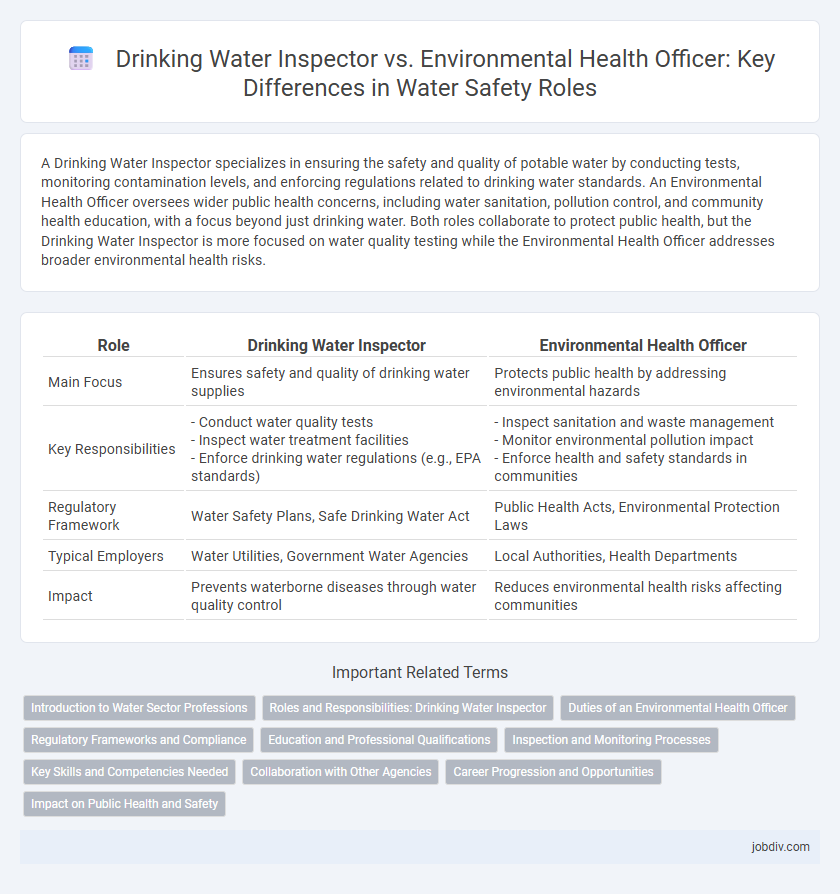A Drinking Water Inspector specializes in ensuring the safety and quality of potable water by conducting tests, monitoring contamination levels, and enforcing regulations related to drinking water standards. An Environmental Health Officer oversees wider public health concerns, including water sanitation, pollution control, and community health education, with a focus beyond just drinking water. Both roles collaborate to protect public health, but the Drinking Water Inspector is more focused on water quality testing while the Environmental Health Officer addresses broader environmental health risks.
Table of Comparison
| Role | Drinking Water Inspector | Environmental Health Officer |
|---|---|---|
| Main Focus | Ensures safety and quality of drinking water supplies | Protects public health by addressing environmental hazards |
| Key Responsibilities |
- Conduct water quality tests - Inspect water treatment facilities - Enforce drinking water regulations (e.g., EPA standards) |
- Inspect sanitation and waste management - Monitor environmental pollution impact - Enforce health and safety standards in communities |
| Regulatory Framework | Water Safety Plans, Safe Drinking Water Act | Public Health Acts, Environmental Protection Laws |
| Typical Employers | Water Utilities, Government Water Agencies | Local Authorities, Health Departments |
| Impact | Prevents waterborne diseases through water quality control | Reduces environmental health risks affecting communities |
Introduction to Water Sector Professions
Drinking Water Inspectors specialize in monitoring water quality to ensure compliance with safety standards and prevent contamination in public water supplies. Environmental Health Officers have a broader role encompassing public health protection, including overseeing water sanitation, waste management, and environmental hazards. Both professions collaborate to safeguard community health by enforcing regulations and promoting safe water practices.
Roles and Responsibilities: Drinking Water Inspector
Drinking Water Inspectors are responsible for monitoring water quality compliance with public health standards and ensuring safe drinking water supplies through regular sampling and testing. They enforce regulations related to water treatment, contamination control, and infrastructure maintenance to prevent waterborne diseases. These inspectors collaborate with local authorities to identify risks, implement corrective measures, and protect community health from water quality hazards.
Duties of an Environmental Health Officer
An Environmental Health Officer (EHO) is responsible for monitoring water quality to ensure compliance with public health standards, conducting inspections of water supply systems, and investigating waterborne disease outbreaks. EHOs enforce regulations related to drinking water safety, assess potential contamination sources, and liaise with water utilities to mitigate risks. They play a crucial role in safeguarding public health by identifying and addressing environmental hazards impacting drinking water.
Regulatory Frameworks and Compliance
Drinking Water Inspectors enforce regulatory frameworks such as the Safe Drinking Water Act, ensuring water quality standards are met to protect public health. Environmental Health Officers oversee broader compliance, including environmental impacts and sanitation, aligning with regulations like the Environmental Protection Act. Both roles collaborate to maintain stringent water safety protocols and regulatory compliance across sources and distribution systems.
Education and Professional Qualifications
Drinking Water Inspectors typically hold degrees in environmental science, chemistry, or public health, paired with certifications in water quality management and regulatory compliance. Environmental Health Officers usually possess qualifications in environmental health or occupational health, supported by professional registration and training in risk assessment and public health legislation. Both roles require continuous professional development to stay updated with evolving standards and regulations in water safety and public health protection.
Inspection and Monitoring Processes
Drinking Water Inspectors conduct rigorous sampling, on-site testing, and compliance audits to ensure water safety standards meet regulatory requirements. Environmental Health Officers oversee broader environmental health risks, including water quality, implementing monitoring programs and investigating contamination sources. Both roles use data-driven inspections and continuous monitoring to protect public health through maintaining safe drinking water supplies.
Key Skills and Competencies Needed
Drinking Water Inspectors require expertise in water quality testing, regulatory compliance, and risk assessment to ensure safe potable water standards. Environmental Health Officers possess broad competencies in public health regulations, environmental monitoring, and hazard identification, enabling them to address waterborne disease risks and environmental impacts. Both roles demand strong analytical skills, attention to detail, and the ability to interpret scientific data for effective water safety management.
Collaboration with Other Agencies
Drinking Water Inspectors collaborate closely with Environmental Health Officers to ensure compliance with water quality standards and public health regulations. Their joint efforts involve coordinating with local water utilities, public health departments, and environmental agencies to monitor contamination risks and implement corrective actions. This inter-agency collaboration enhances rapid response to water safety issues and promotes consistent enforcement of environmental health policies.
Career Progression and Opportunities
A Drinking Water Inspector specializes in monitoring and testing water quality to ensure compliance with safety standards, often advancing into senior technical roles or water quality management positions. Environmental Health Officers have a broader scope, including investigating environmental hazards and enforcing public health regulations, with career progression opportunities into policy development, environmental consultancy, or public health leadership roles. Both careers offer pathways to specialized expertise and leadership within public health and environmental protection sectors.
Impact on Public Health and Safety
Drinking Water Inspectors ensure the safety and quality of potable water by monitoring contaminants, enforcing water quality standards, and preventing waterborne diseases. Environmental Health Officers assess broader environmental factors, including sanitation, waste management, and pollution control, that indirectly affect water safety and public health. Their combined efforts reduce health risks associated with contaminated water sources, promoting community well-being and preventing outbreaks of water-related illnesses.
Drinking Water Inspector vs Environmental Health Officer Infographic

 jobdiv.com
jobdiv.com